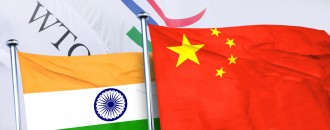
India-US trade: Issues on IPP and Solar Cells vital
Sai Nikesh | The Dollar Business  Despite the positive signs of strengthening trade between the United States and India, there also exist few challenges before the two nations, which they need to overcome to ensure comfortable bilateral trade. The very first contention between the countries over trade occurs at the point of Bilateral Investment Treaty (BIT) of the two countries. While India wants to put Intellectual Property Protections (IPP) and taxations out of the scope of India-US BIT, the US is unlikely to accept India’s position on the matter. The real ideology difference between the countries arise at this juncture, where the American pharmaceutical companies wants India to strengthen its regulatory regime and allow US style of patent policy, thereby avoiding compulsory licensing on India’s patent drugs. When contacted by The Dollar Business, Dr Gopakumar G Nair, ex-president of Indian Drug Manufacturers’ Association (IDMA) and founder of GN Associates, a premier Intellectual Property (IP) consultancy, said,” In view of WTO rules, India is currently under pressure over IP issues with the MNCs and there is also a litigation relating to implementation of US-style procedures in the Indian pharma sector.” According to reports, India is opposed to that US IPP policy, owing to domestic demands from its local generic manufacturers, who decry ‘that they will lose much of their business by adopting US-style patent protection’. Nair, however, says, ‘Many Indian companies are willing to work with MNCs through voluntary licensing and mutually-negotiable procedures favouring Make in India.’ He went on to say that owing to 1970 Pact, India was not allowing patent rights to pharma products and now India has to consider WTO conditions in the present case. On a whole, Nair suggests that it would be better if India concentrates on making non- fringing products and processes in order to avoid patent litigations, which it is definitely capable of doing.’ Here it is noteworthy to mention the long-standing position of India on IPP which says, “IPP is a domestic matter which is not supposed to be discussed with trade partners.” However, during Modi’s visit to US, India has agreed to sit on IPP issue with the US expert committee and the results to this effect are not unknown yet. Another point of contention is about the long-pending dispute between the countries over the issue of solar cells and modules. The United States has been raising consultations at the WTO Dispute Settlement Board(DSB), seeking action against India over its domestic procurement of solar cells and modules. While the US alleges that India is violating WTO norms by not giving fair and non-discriminatory access equally to foreign and domestic firms, India says that the US is unfairly subsidizing the its own technology manufacturers. After filing the issue at DSB on February 6, 2013, the US lastly on April 14, 2014, requested the DSB for the establishment of a panel over the issue. However, the DSB, at its meeting on April 25, 2014, deferred the establishment of a panel and is still to be resolved. In its recent move on January 29, 2014, India’s National Thermal Power Corporation has barred foreign bids for three solar projects in India. One of the spokesperson of NTPC was quoted to have said the sources that, ‘Only Indian firms can bid for the domestic solar projects.’ However, he added that Indian subsidiaries of foreign manufacturers may take part in future solar projects. More supposed bids of NTPC for new solar projects in India would definitely add fuel to the fire existing between the two countries over the exchange of trade in energy aspects. In his recent statement on a day after the US government released its annual budget, White House's senior director for South Asian Affairs Phil Reiner had said that the US will continue to push for further progress on Intellectual Property Rights, local content requirements, among other key issues, as a part of strong bilateral trade. Apart from that, the US officials were quoted to have said that the details of an insurance scheme to protect suppliers from crippling law-suits need to be thrashed out and India still has to ratify a UN Nuclear convention. While the United States BIT, 2012, recognizes the need for enforcement of rights on its partner country with respect to making investments, the new BIT of India drops the Most Favoured Nation status against ‘effective means of asserting claims and enforcing rights’. India’s new model contains obligations on the investors’ side over the issue of corruption, taxation, among others. India’s treaty also says that that the investors need to put their claims first before the domestic courts, before going for international arbitrations. In view of these existing long-pending and key challenges, we may not be able to say how long it will take for the United States and India to fully ensure long-sustaining trade ties.
Despite the positive signs of strengthening trade between the United States and India, there also exist few challenges before the two nations, which they need to overcome to ensure comfortable bilateral trade. The very first contention between the countries over trade occurs at the point of Bilateral Investment Treaty (BIT) of the two countries. While India wants to put Intellectual Property Protections (IPP) and taxations out of the scope of India-US BIT, the US is unlikely to accept India’s position on the matter. The real ideology difference between the countries arise at this juncture, where the American pharmaceutical companies wants India to strengthen its regulatory regime and allow US style of patent policy, thereby avoiding compulsory licensing on India’s patent drugs. When contacted by The Dollar Business, Dr Gopakumar G Nair, ex-president of Indian Drug Manufacturers’ Association (IDMA) and founder of GN Associates, a premier Intellectual Property (IP) consultancy, said,” In view of WTO rules, India is currently under pressure over IP issues with the MNCs and there is also a litigation relating to implementation of US-style procedures in the Indian pharma sector.” According to reports, India is opposed to that US IPP policy, owing to domestic demands from its local generic manufacturers, who decry ‘that they will lose much of their business by adopting US-style patent protection’. Nair, however, says, ‘Many Indian companies are willing to work with MNCs through voluntary licensing and mutually-negotiable procedures favouring Make in India.’ He went on to say that owing to 1970 Pact, India was not allowing patent rights to pharma products and now India has to consider WTO conditions in the present case. On a whole, Nair suggests that it would be better if India concentrates on making non- fringing products and processes in order to avoid patent litigations, which it is definitely capable of doing.’ Here it is noteworthy to mention the long-standing position of India on IPP which says, “IPP is a domestic matter which is not supposed to be discussed with trade partners.” However, during Modi’s visit to US, India has agreed to sit on IPP issue with the US expert committee and the results to this effect are not unknown yet. Another point of contention is about the long-pending dispute between the countries over the issue of solar cells and modules. The United States has been raising consultations at the WTO Dispute Settlement Board(DSB), seeking action against India over its domestic procurement of solar cells and modules. While the US alleges that India is violating WTO norms by not giving fair and non-discriminatory access equally to foreign and domestic firms, India says that the US is unfairly subsidizing the its own technology manufacturers. After filing the issue at DSB on February 6, 2013, the US lastly on April 14, 2014, requested the DSB for the establishment of a panel over the issue. However, the DSB, at its meeting on April 25, 2014, deferred the establishment of a panel and is still to be resolved. In its recent move on January 29, 2014, India’s National Thermal Power Corporation has barred foreign bids for three solar projects in India. One of the spokesperson of NTPC was quoted to have said the sources that, ‘Only Indian firms can bid for the domestic solar projects.’ However, he added that Indian subsidiaries of foreign manufacturers may take part in future solar projects. More supposed bids of NTPC for new solar projects in India would definitely add fuel to the fire existing between the two countries over the exchange of trade in energy aspects. In his recent statement on a day after the US government released its annual budget, White House's senior director for South Asian Affairs Phil Reiner had said that the US will continue to push for further progress on Intellectual Property Rights, local content requirements, among other key issues, as a part of strong bilateral trade. Apart from that, the US officials were quoted to have said that the details of an insurance scheme to protect suppliers from crippling law-suits need to be thrashed out and India still has to ratify a UN Nuclear convention. While the United States BIT, 2012, recognizes the need for enforcement of rights on its partner country with respect to making investments, the new BIT of India drops the Most Favoured Nation status against ‘effective means of asserting claims and enforcing rights’. India’s new model contains obligations on the investors’ side over the issue of corruption, taxation, among others. India’s treaty also says that that the investors need to put their claims first before the domestic courts, before going for international arbitrations. In view of these existing long-pending and key challenges, we may not be able to say how long it will take for the United States and India to fully ensure long-sustaining trade ties.
This article was published on February 11, 2015.






 to success.
to success.